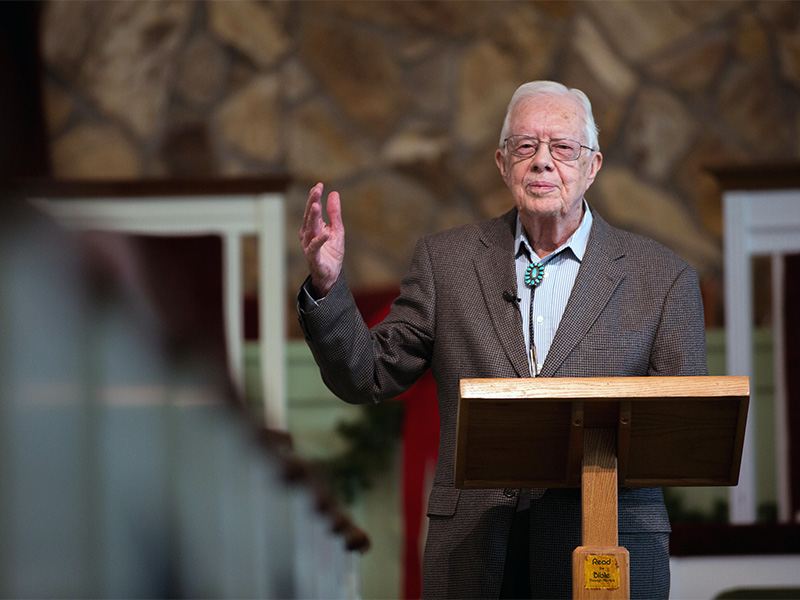
(RNS) — As we reflect on the passing of President Jimmy Carter at the age of 100, we should honor one of the core throughlines of his incredible life: his faith. As a Baptist minister, I particularly want to celebrate how Carter carried himself as a person with deeply held religious convictions, while leading a diverse democracy in which people of all faiths and backgrounds deserve equal dignity and treatment under the law.
I had the privilege of interviewing Carter several times on the role religion played in his life and work. He was one of the most intelligent and formidable people I’ve ever spoken to. I remember trembling a bit when I asked the first question: If he was comfortable with the title of “Sunday school teacher.”
He responded without hesitation, recounting how he started teaching Sunday school at age 18 at the Naval Academy Chapel — and later led services while at sea. During his presidency, he taught Sunday school 14 times at a nearby D.C. church, and, at the time of my interview in 2012, he had just completed his 650th lesson at Maranatha Baptist Church. “So, you might say I have been a Sunday school teacher all my life.”
Carter was arguably the most religious president since World War II. Yet, he was careful about how his faith featured in his official role. One of his most important religious influences was the towering evangelical force of the Rev. Billy Graham. Yet, President Carter never invited Graham to hold services in the White House, explaining, “I believed what my father taught me about the separation of church and state, so I didn’t think it was appropriate. He was injured a little bit, until I explained it to him.”
Carter saw how religion could inspire good works and movements for justice and peace without being imposed on others. “I think you can apply the principles of your faith in your service to the public, but you should not use your political authority to extoll your own faith at the expense of others … I don’t think the President of the United States should extol Christianity if he happens to be a Christian at the expense of Judaism, Islam or other faiths.”
Carter called upon his faith at the Camp David Accords in 1978, when he invited Menachem Begin of Israel and Anwar Sadat of Egypt to the presidential retreat in Maryland for two weeks of talks. He made sure rooms were set aside for Muslims, Jews and Christians to pray throughout the process. “The Muslims used it on Friday, the Jews on Saturday, and the Christians on Sunday. We were very assiduous in our worship,” Carter said.

FILE – Egyptian President Anwar Sadat, left, U.S. President Jimmy Carter, center, and Israeli Prime Minister Menachem Begin clasp hands on the north lawn of the White House after signing the peace treaty between Egypt and Israel, March 26, 1979, in Washington. (AP Photo/ Bob Daugherty, File)
Later, Carter became a model of what a person can do in life after the presidency. He founded the Carter Center, which focuses on election monitoring, peace negotiations and fighting some of the world’s worst diseases. This work was a continuation of his commitment to public service, driven by the principles of his faith.
When Carter released his book on the Bible, I warned him I’d be asking tough questions — about the compatibility of religion and science, the role of women, interfaith relations and more. He answered with grace and reason. Then, I asked a more personal question. It was 2012, and marriage equality was still a few years away. Public opinion was deeply divided on the rights of gay people, and Christians offered some of the most virulent condemnation for people like me — a Baptist minister and a gay man who had been in a relationship with my partner for more than 10 years.
I said to the Sunday school teacher, military vet and former president, “A lot of people point to the Bible for reasons why gay people should not be in the church. What do you think the Bible says?”
Carter’s response was profound: “Homosexuality was well known in the ancient world, well before Christ was born, and Jesus never said a word about homosexuality. In all of his teachings about multiple things — he never said that gay people should be condemned. Jesus would not be against marriage between any two people if they were genuinely in love.”
Hearing this from Carter was deeply moving. His words resonated and were quoted widely. His acceptance was unbelievable to some and even resulted in fact-checking sites reviewing and referring to my interview.
There is a deeply ingrained misconception that religious people are by definition conservative, ignoring the countless examples of religious leaders who have propelled our nation forward. Carter, a deeply faithful man and influential example, played a role in advancing equality, including making my marriage and the opportunity to raise children possible.
We find ourselves in a perilous moment, as those who champion Christian nationalism seek to dominate our politics, government and society. Carter understood this threat all too well, noting that “the alliance between ultra-right wing religious believers and the Republican Party seems to be permanent.”
Perhaps President Carter’s most enduring lesson both as a Sunday school teacher and political leader was the model he offered of deep faith rooted in tolerance, compassion and equality. To truly honor his achievements and legacy, we must safeguard religious liberty and civil rights, not just for a few, but for all.
(Rev. Paul Brandeis Raushenbush is the president and CEO of Interfaith Alliance. The views expressed in this commentary do not necessarily reflect those of Religion News Service.)
